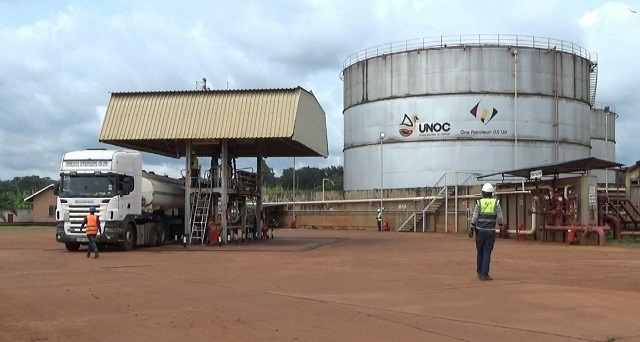
Jinja, Uganda | THE INDEPENDENT | Uganda’s oil reserves in Jinja have run out of fuel, Uganda National Oil Company-UNOC depot manager, Joel Nkangi has announced amidst a crisis that has led to an escalation of fuel prices in recent weeks.
Pump prices have now increased to an average of 6,000 Shillings at stations across Kampala, while in some upcountry towns, a litre of petrol is sold at an average of 10,000 Shillings. The trend started with a standoff on the Uganda-Kenya border in Busia and Malaba where truck drivers stationed their trucks in protest of a mandatory COVID-19 test by Ugandan authorities even for those with a negative PCR test from Kenya.
Nkangi says that the reserves have a storage capacity of 30 million litres, against a monthly demand of between 200 and 230 million litres of fuel in the country. He adds that all the fuel in the reserves could only contain the situation for a period of one week in case of a crisis.
He notes that the availability of fuel at the reserves depends on constant fuel supply within the country and any form of scarcity, automatically results in complete emptying of the fuel tanks, following the inadequate storage facilities at the depot.
Nkangi also says that oil companies absorb while replenishing the reserve tanks in the due course, which contributes to the stability of the fuel supply chain. But with the current standoff, UNOC partners have since emptied all the reserves to meet their clients demands.
He further stresses that most of the fuel at the reserves is largely received via road trucks and the current backup of importing fuel through the railway line system is inefficient to serve both the nationwide fuel demand and replenishing of the oil reserves.
Nkangi however advises that if at all water transport is well revamped, it can effectively serve as an alternative to address future fuel import crisis incidents, following the high-level carriage capacities of some water vessels that can ferry an estimate of 300 fuel wagons per trip.
The current fuel scarcity has contributed to a hike in fuel prices, with petrol costing a record 10,000 Shillings per litre in some parts of the country, which has now contributed to an increase in the prices of both goods and services.
*****
URN
 The Independent Uganda: You get the Truth we Pay the Price
The Independent Uganda: You get the Truth we Pay the Price



